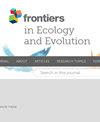底栖大型无脊椎动物对整个三角洲环境梯度上河口新兴沼泽恢复的反应
IF 2.4
3区 环境科学与生态学
Q2 ECOLOGY
引用次数: 0
摘要
底栖无脊椎动物在河口生态系统中发挥着至关重要的作用,但与其他类群一样,它们也因筑堤和土地用途转换而被排除在原沼泽地之外。拆除堤坝是恢复沼泽的一种方法,但对底栖无脊椎动物的反应研究甚少。此外,整个三角洲底栖无脊椎动物群落的变化也未得到充分研究,尤其是在北美西北太平洋地区,三角洲的水流量和沉积物负荷都很高。我们的目标是评估无脊椎动物对美国华盛顿州普吉特海湾尼斯夸里河三角洲大规模堤坝拆除的反应,描述整个三角洲无脊椎动物群落的变化,并将无脊椎动物的反应和空间变化与环境条件联系起来。从堤坝拆除前一年到拆除后三年,我们每年都会在恢复沼泽、先前恢复的沼泽、未受干扰的参照沼泽以及邻近的潮滩上采集无脊椎动物样本。海洋分类群立即在最近恢复潮汐淹没的区域定居,其中几个分类群的种群数量随后呈指数增长。三年后,群落组成和多样性完全恢复,密度和生物量也接近恢复。无脊椎动物群落在恢复沼泽和原有沼泽(先前恢复的沼泽和参考沼泽)之间趋于一致,这表明重建的连通性产生了影响。在堤坝线近海处,无脊椎动物在堤坝拆除一年后减少,但随后又反弹,这表明它们对短期干扰具有恢复能力。在离岸更远的地方没有发现堤坝移除的影响。在三角洲离岸边缘附近,无脊椎动物的生物量和体型都比其他地方大,并出现了甲壳类、多毛目环节动物和双壳类动物的多样化组合。离岸较远的潮汐滩涂则以少数几种小体型多毛类为主,密度较高,但生物量和多样性较低。滩涂各处的主要摄食类群是兼性食腐动物(也可滤食)。沼泽上的密度、生物量、多样性和群落组成与内侧潮滩比外侧潮滩更为相似。与无脊椎动物群落变化最相关的环境变量是海拔、盐度、沉积物粒度和有机物含量。我们的研究结果对评估未来恢复工作的绩效和设定预期具有重要意义,并对底栖无脊椎动物在河口生态系统中的作用具有广泛影响。本文章由计算机程序翻译,如有差异,请以英文原文为准。
Benthic macroinvertebrate response to estuarine emergent marsh restoration across a delta-wide environmental gradient
Benthic invertebrates play vital roles in estuarine ecosystems, but like other taxa they have been excluded from former marshlands by diking and land use conversion. Dike removal is one way of restoring marsh, but the response of benthic invertebrates has been little studied. Also understudied is variation in benthic invertebrate communities across entire deltas, particularly in the Pacific Northwest of North America where deltas receive high flows and sediment loads for their size. Our goals were to evaluate invertebrate response to large-scale dike removal on the Nisqually River Delta in Puget Sound, Washington, U.S.A., characterize delta-wide invertebrate community variation, and relate invertebrate response and spatial variation to environmental conditions. We sampled invertebrates annually from one year before to three years after dike removal in restoring marsh, previously restored marsh, undisturbed reference marsh, and adjacent tidal flats. Marine taxa immediately colonized the area recently restored to tidal inundation and population size grew exponentially thereafter for several of them. Community composition and diversity recovered completely, and density and biomass were approaching recovery three years later. Invertebrate communities converged between restoring and pre-existing marsh (previously restored and reference), suggesting an influence of reestablished connectivity. Just offshore from the dike line, invertebrates declined one year after dike removal but then rebounded indicating resilience to short-term disturbance. Dike removal effects were not detected farther offshore. Near the offshore edge of the delta, invertebrate biomass and body size were greater than elsewhere and a diverse assemblage of crustaceans, polychaetes, and bivalves was present. Farther inshore, tidal flats were dominated by a few species of small-bodied polychaetes and had higher density but lower biomass and diversity. Facultative detritivores, which can also filter feed, were the dominant feeding guild everywhere on the tidal flats. Density, biomass, diversity, and community composition on the marsh were more similar to the inner than outer tidal flats. Environmental variables most associated with invertebrate community variation were elevation, salinity, and sediment grain size and organic content. Our results are relevant to assessing performance and setting expectations for future restorations and have broad implications for the role of benthic invertebrates in estuarine ecosystems.
求助全文
通过发布文献求助,成功后即可免费获取论文全文。
去求助
来源期刊

Frontiers in Ecology and Evolution
Environmental Science-Ecology
CiteScore
4.00
自引率
6.70%
发文量
1143
审稿时长
12 weeks
期刊介绍:
Frontiers in Ecology and Evolution publishes rigorously peer-reviewed research across fundamental and applied sciences, to provide ecological and evolutionary insights into our natural and anthropogenic world, and how it should best be managed. Field Chief Editor Mark A. Elgar at the University of Melbourne is supported by an outstanding Editorial Board of international researchers. This multidisciplinary open-access journal is at the forefront of disseminating and communicating scientific knowledge and impactful discoveries to researchers, academics and the public worldwide.
Eminent biologist and theist Theodosius Dobzhansky’s astute observation that “Nothing in biology makes sense except in the light of evolution” has arguably even broader relevance now than when it was first penned in The American Biology Teacher in 1973. One could similarly argue that not much in evolution makes sense without recourse to ecological concepts: understanding diversity — from microbial adaptations to species assemblages — requires insights from both ecological and evolutionary disciplines. Nowadays, technological developments from other fields allow us to address unprecedented ecological and evolutionary questions of astonishing detail, impressive breadth and compelling inference.
The specialty sections of Frontiers in Ecology and Evolution will publish, under a single platform, contemporary, rigorous research, reviews, opinions, and commentaries that cover the spectrum of ecological and evolutionary inquiry, both fundamental and applied. Articles are peer-reviewed according to the Frontiers review guidelines, which evaluate manuscripts on objective editorial criteria. Through this unique, Frontiers platform for open-access publishing and research networking, Frontiers in Ecology and Evolution aims to provide colleagues and the broader community with ecological and evolutionary insights into our natural and anthropogenic world, and how it might best be managed.
 求助内容:
求助内容: 应助结果提醒方式:
应助结果提醒方式:


